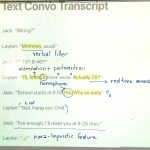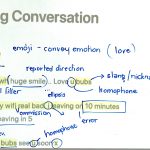An exploration of the sophistication and richness of the way we modify and elaborate on standard English to enrich our interpersonal communication.
First check you’ve completed Stage 1
Stage 2:
Transcribe an instant messaging conversation and annotate it for all instances that deviate from standard English.
- Exemplar of an annotated text conversation
- Exemplar 2 – Text Messaging Conversation
TEXT LANGUAGE GLOSSARY
These are particular to online and text communication.
Emoticons – graphic symbols representing emotions
Acronyms – use of words’ initial letters to form a single new word e.g. AIDS
Initialisms – initial letters spelled out e.g. OMG
Contractions – omitted letters, e.g. txt
Logograms – single letters or numbers replacing sections of words e.g. 2day for today or u for you
Ellipsis – omitted parts of a sentence e.g. coming?
Unusual spelling – e.g. wiv for with (often reflecting an accent)
Merged words – e.g. seeya
Repeated letters for emphasis e.g. helllllo
Upper case or lower case to donate tone e.g. NO WAY
Punctuation omitted or added for effect e.g. dont be late!!!
Speech-like interjections e.g. ha ha
Stage 3: Develop an Hypothesis
Based on your gathering and annotation of your speech and text conversations, develop an hypothesis about why we make the modifications we do to the language when we communicate inter-personally.
- Original Purpose of Written Language
- Modifications to Written Language in the Text Messaging Domain
- Tasks to complete
- Example of a straight-forward analytical paragraph
- Hypothesis Examples







0 Comments